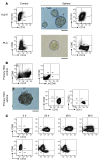CD13 is a therapeutic target in human liver cancer stem cells
- PMID: 20697159
- PMCID: PMC2929722
- DOI: 10.1172/JCI42550
CD13 is a therapeutic target in human liver cancer stem cells
Abstract
Cancer stem cells (CSCs) are generally dormant or slowly cycling tumor cells that have the ability to reconstitute tumors. They are thought to be involved in tumor resistance to chemo/radiation therapy and tumor relapse and progression. However, neither their existence nor their identity within many cancers has been well defined. Here, we have demonstrated that CD13 is a marker for semiquiescent CSCs in human liver cancer cell lines and clinical samples and that targeting these cells might provide a way to treat this disease. CD13+ cells predominated in the G0 phase of the cell cycle and typically formed cellular clusters in cancer foci. Following treatment, these cells survived and were enriched along the fibrous capsule where liver cancers usually relapse. Mechanistically, CD13 reduced ROS-induced DNA damage after genotoxic chemo/radiation stress and protected cells from apoptosis. In mouse xenograft models, combination of a CD13 inhibitor and the genotoxic chemotherapeutic fluorouracil (5-FU) drastically reduced tumor volume compared with either agent alone. 5-FU inhibited CD90+ proliferating CSCs, some of which produce CD13+ semiquiescent CSCs, while CD13 inhibition suppressed the self-renewing and tumor-initiating ability of dormant CSCs. Therefore, combining a CD13 inhibitor with a ROS-inducing chemo/radiation therapy may improve the treatment of liver cancer.
Figures









Comment in
-
A marker for dormant cancer stem cells in human hepatocellular carcinoma.Gastroenterology. 2011 Apr;140(4):1353-5; discussion 1355. doi: 10.1053/j.gastro.2011.02.039. Epub 2011 Feb 24. Gastroenterology. 2011. PMID: 21354167 No abstract available.
-
CD13: Waving the flag for a novel cancer stem cell target.Hepatology. 2011 Apr;53(4):1388-90. doi: 10.1002/hep.24222. Hepatology. 2011. PMID: 21480341
References
-
- Holyoake T, Jiang X, Eaves C, Eaves A. Isolation of a highly quiescent subpopulation of primitive leukemic cells in chronic myeloid leukemia. Blood. 1999;94(6):2056–2064. - PubMed
Publication types
MeSH terms
Substances
LinkOut - more resources
Full Text Sources
Other Literature Sources
Medical
Miscellaneous

